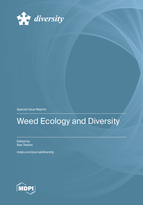Weed Ecology and Diversity
A special issue of Diversity (ISSN 1424-2818). This special issue belongs to the section "Plant Diversity".
Deadline for manuscript submissions: closed (30 September 2023) | Viewed by 22606
Special Issue Editor
Interests: agronomy; weed biology and ecology; herbicide resistance; integrated weed management; agroecological weed management
Special Issues, Collections and Topics in MDPI journals
Special Issue Information
Dear Colleagues,
We are surrounded by weeds; in all places humans set foot, weeds will follow, and, in some cases, they become so successful that they invade human-impacted and natural habitats. The term “weed” is rather subjective as we are the ones who decide what plants are called weeds, and the term usually carries a negative connotation. However, there is a reason why weeds grow where they grow and behave in their particular manner. Today, certain groups of weeds have become extremely rare, and some species have even gone extinct from areas where they were once abundant. Climate change also creates a huge challenge, and weeds often act as indicators of this change.
In this Special Issue, we intend to publish contributions assessing the ecology and diversity of weeds in natural and human-impacted ecosystems. We would like to focus on how ecology impacts weeds' distribution, abundance, and diversity and how anthropogenic factors create and destroy specific weed communities. Further topics to be addressed include: 1) The role of weeds in plant communities; 2) How weeds change plant communities; 3) The benefits of weeds; 4) Weeds as bioindicators; 5) Invasive weed species; 6) Preservation of weed diversity; 7) How weed ecology can guide weed management.
With this in mind, we hope to better understand the importance of diverse weed communities and make sure that we do not only see weeds as pests but also recognize their benefits and the need for integrated and holistic management.
Dr. Ilias Travlos
Guest Editor
Manuscript Submission Information
Manuscripts should be submitted online at www.mdpi.com by registering and logging in to this website. Once you are registered, click here to go to the submission form. Manuscripts can be submitted until the deadline. All submissions that pass pre-check are peer-reviewed. Accepted papers will be published continuously in the journal (as soon as accepted) and will be listed together on the special issue website. Research articles, review articles as well as short communications are invited. For planned papers, a title and short abstract (about 100 words) can be sent to the Editorial Office for announcement on this website.
Submitted manuscripts should not have been published previously, nor be under consideration for publication elsewhere (except conference proceedings papers). All manuscripts are thoroughly refereed through a single-blind peer-review process. A guide for authors and other relevant information for submission of manuscripts is available on the Instructions for Authors page. Diversity is an international peer-reviewed open access monthly journal published by MDPI.
Please visit the Instructions for Authors page before submitting a manuscript. The Article Processing Charge (APC) for publication in this open access journal is 2600 CHF (Swiss Francs). Submitted papers should be well formatted and use good English. Authors may use MDPI's English editing service prior to publication or during author revisions.
Keywords
- Weed diversity
- Weeds
- Agro-ecology
- Weed communities
- Biodiversity
- Competition
- Indicators
- Conservation practices






